Elaine Riberich volunteers as a garden steward with the Western Pennsylvania Conservancy, tending gardens at the busy intersections of Beechwood, Saline and Hazelwood avenues and at Forbes Avenue in Oakland, next to Dippy the dinosaur. Her dedication to stewarding community flower gardens is so great that she even convinced a city councilwoman to refurbish nearby benches at one garden so visitors could sit and enjoy the lovely space.
After City of Pittsburgh Councilperson Erika Strassburger stopped by the Oakland garden while Elaine was volunteering, Elaine contacted her about some wooden benches that desperately needed repairs. “She immediately had them refurbished and continues to have them checked and restored,” says Elaine, who regularly washes and clears the benches of leaves, and picks up garbage in the immediate area. “It makes it a much more inviting spot to sit, reflect and eat while appreciating the beauty of this wonderful community open space.”
Each spring, summer and fall, the Western Pennsylvania Conservancy’s 130 community flower gardens bring color and joy to neighborhoods all around the Pittsburgh region. More than 5,000 volunteers, including Elaine, help plant and steward the gardens, which appear at intersections, along roadways and even at schools.
In addition to the gardens, the Conservancy, a nonprofit organization, protects and restores exceptional places in western Pennsylvania. It has helped establish 11 state parks, conserved more than a quarter million acres of natural lands, protected or restored more than 3,000 miles of rivers and streams, and assesses hundreds of wildlife species and their habitats. It owns and operates Fallingwater, which is on the UNESCO World Heritage List.
The garden volunteers are all ages, from all walks of life and of all skill levels. “They are seniors and children, individuals, families, community groups or corporate volunteers,” says Lynn McGuire-Olzak, the Conservancy’s community garden volunteer coordinator. “Some have never planted flowers before, and others are skilled gardeners who have been planting with us for years.”
Volunteer gardeners don’t necessarily need to have green thumbs, but rather a willingness to learn fairly straightforward gardening tasks and how to recognize which plants are weeds and which are flowers. In the spring, volunteers plant flowers and spread mulch in the flower beds, which are prepared ahead of time by staff members. In the fall, they prepare the gardens for cold weather by removing annuals and cleaning up trash. Volunteers can volunteer once for a couple of hours, or multiple hours at various gardens. Each garden has a volunteer garden steward, like Elaine, who weeds and maintains the garden on a regular basis, such as weekly or biweekly.
Elaine has been tending gardens since 2001. “Usually at the beginning of spring, I clear weeds from sections of the garden that will not be planted,” she says. “Where the flowers are to be planted, the Conservancy covers the ground with plastic preventing weeds from coming up between the flowers. Then a team of wonderful volunteers digs holes through the plastic and into the ground to insert the delicate, tiny annual plants. The whole garden area is painstakingly covered with mulch one bucket at a time. For the rest of the summer, I am responsible for keeping these flowers healthy, alive and blooming by watering and weeding it all, and clearing the sidewalks of leaves and debris. In the fall, faithful volunteers pull out the dead plants and lift up all the plastic.”
Another steward and Elaine’s close friend, Denise Chizmar, answered the call to volunteer with the Western Pennsylvania Conservancy 25 years ago and hasn’t looked back. Three community flower gardens have benefited from her gardening know how, and she loves passing that knowledge onto other volunteers. Denise currently stewards for the garden at Boulevard of the Allies and Anderson Street.
“When I was the steward in Connellsville, I planted with fourth grade students from a nearby elementary school,” Denise recalls. “While it could be chaotic with 30-plus fourth graders, it was also fun watching them learn to plant the flowers. For some of them, it was their first planting experience and I hope they would want to continue to garden with their families.”
In addition to creating a beautiful, colorful landscape for people to enjoy, being outdoors and getting exercise are benefits of gardening, Elaine acknowledges. “I love watching the small plants grow. The bending and exercise is tiresome but afterwards makes me feel much better. People are always appreciative and express their thanks in many ways.”
If you are interested in helping to beautify the region by planting or tending the Conservancy’s community flower gardens, call Lynn at (412) 586-2324 or email lmcguire-olzak@paconserve.org. Other volunteer opportunities, such as tree-planting, land stewardship and clerical opportunities, are also available. For more information, visit WaterLandLife.org.

